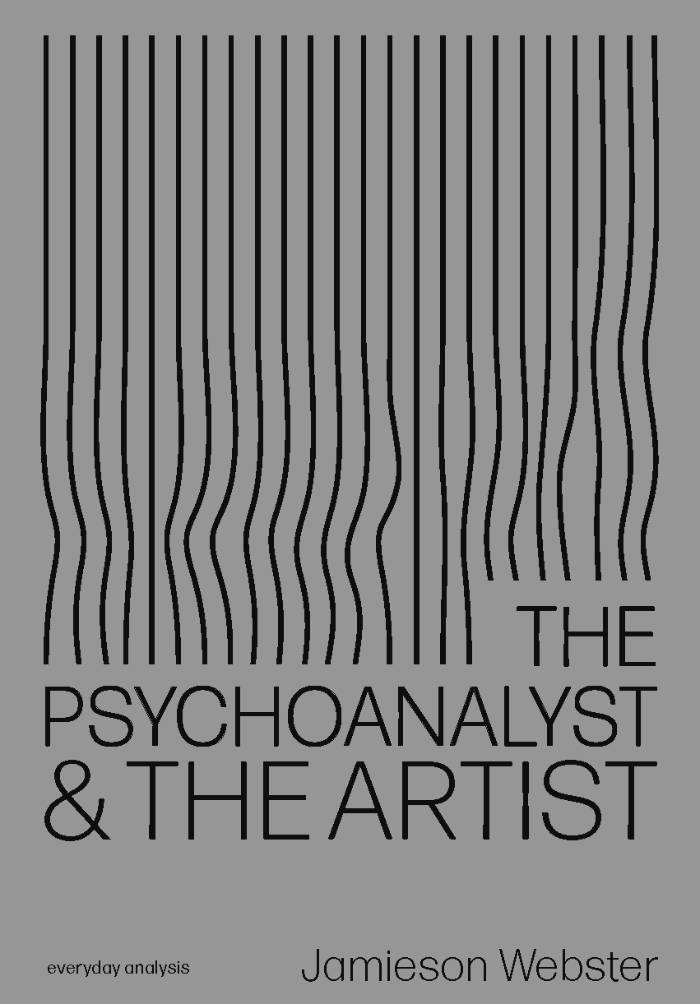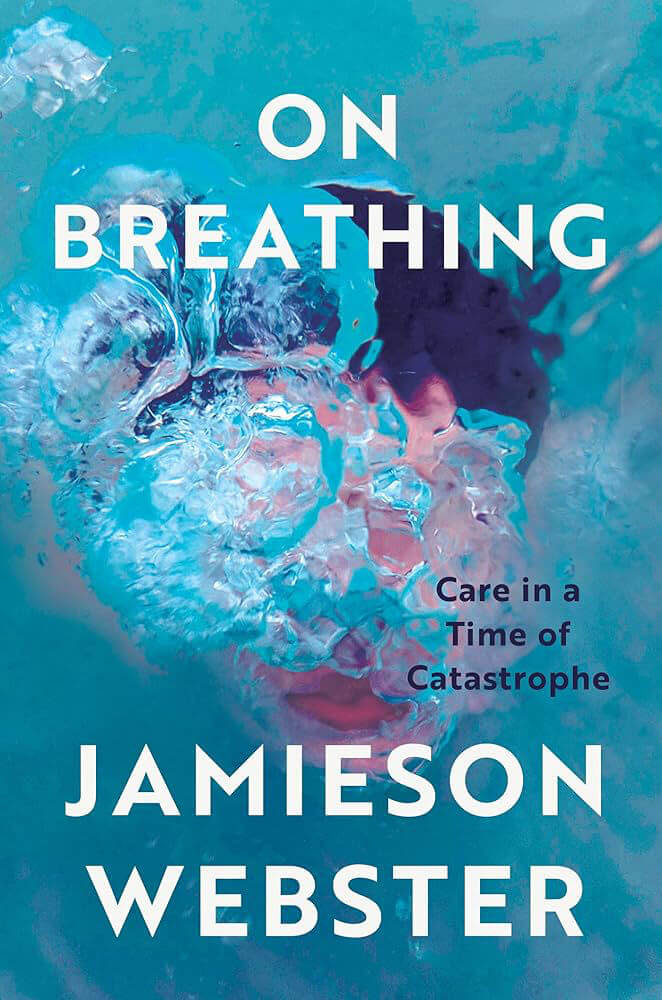Jamieson Webster
Jamieson Webster

The Psychoanalyst And The Artist
In these essays, New York psychoanalyst and author Jamieson Webster considers the relationship between the studio and the psychoanalyst's couch. From the scopophilic instinct of the viewer and the artist's anticipation of it to the pursuit of perfection and it's connection to the girl-child's curiosity about her mother's body, she asks us to think about art and analysis as connected practices. Focusing on Carroll Dunham and Louise Bourgeois, she argues for an embrace of our wildest symptoms in theory and in art.

On Breathing: Care in a Time of Catastrophe
A gorgeous, expansive piece of narrative non-fiction about care, dependence, and what it means to breathe in an age of environmental catastrophe. A few moments after birth we begin to use our lungs for the first time.
From then on, we must continue breathing for as long as we are alive. And although this mostly happens unconsciously, in a society plagued by anxiety, climate change, environmental racism, and illness, there are more and more instances that “teach us about the privilege that is breathing.” Why do we so easily forget the air that we breathe in common? What does it mean to breathe when the environment that sustains life now threatens it? And how can life continue to flourish under conditions that are increasingly toxic? To approach these questions, Jamieson Webster draws on psychoanalytic theory and reflects on her own experiences as an asthmatic teenager, a deep-sea diver, a palliative psychologist during COVID, a psychoanalyst attentive to the somatic, and a new mother. The result is a compassionate and timely exploration of air and breathing as a way to undo the pervasive myth of the individual by considering our dependence on invisible systems, on one another, and the way we have violently neglected this important aspect of life.

Disorganisation & Sex
Never does the patient seem more ill than when they try to order associations into a logical tale. Classical analysis sees this in terms of a repudiation of sexuality: an attempt to avoid speaking from a place of desire. But why should psychoanalysis reduce everything to sex? If sex only ever achieves partial satisfactions, fragments of pleasure, its pursuit creates our subjectivity and our world.
Disorganisation & Sex argues that the sexuality of psychoanalysis is not a reductive biologism, but an archaic remainder that cannot be colonised, endlessly disorienting meaning in our everyday lives. It is our proximity to this terrain that undoes our most tedious habits, and opens onto something revelatory.
And more

Parapraxis 06: Resistance
In 1911, Sigmund Freud addressed his followers gathered at Nuremberg, where he restated the import of his practice: “the task of psychoanalysis lies not at all in the discovering of complexes, but in the dissolving of resistances.” A formal antipode to political resistance, psychoanalytic resistance dams up desire and obstructs traumatic knowledge. It is conservative, allergic to change, and aims for the kind of frictionless normativity against which the unconscious drives rail. Meanwhile, we associate political resistance with change itself, with a blockade that pushes for revolution—rather than a blockage that censors its very possibility. If we read Freud as urging his followers to help their patients move through their resistance, psychoanalysis is a project on the side of material and political reality by bringing patients out of isolation and into social struggles. However, psychoanalysis is often glossed in reverse: as a project of isolated relief for the stubborn individual.
Should psychoanalysis only succeed at rendering patients compliant in their cure? Is psychoanalysis a tool for nullifying political resistance? If so, Freud’s edict for the aim of psychoanalysis is now but an epitaph. It would be easy, then, to give up the ghost, to let psychoanalysis go. But why should psychoanalysis retreat from collective symptoms back into the consulting room for individual treatment—away from strikes, riots, and uprisings, and toward complacency and normativity, if not quite literally marriage and babies? Why should the clinic not dare to be in and of the world?
Feeling restless. Hunger tactics. Laughing in the face of fascism. Breaking through. Diagnosing revolution. Madness in the Maghreb. Essays by Fady Joudah, Jamieson Webster, Dylan Saba, Yasmin El-Rifae, Ussama Makdisi, Mary Turfah, Hannah Proctor, and more.
In Memory of Joshua Clover (1962-2025).

Dominique: The Case of an Adolescent
"Dolto’s Dominique is the only case I’ve found that rivals Freud, and brings us up to date, replete with questions of incestuous trauma, repressed sexualities, autism and cognitive disability, and a profound sense for the contradictions of polite society and histories of colonial and racist violence. I love this child and encountering Dolto’s otherworldly voice as an analyst." — Jamieson Webster
While the child psychoanalyst Françoise Dolto stands alongside Jacques Lacan as a leading light of the Other French School, she has been little translated and remains curiously unknown in the English-speaking world. First published in 1971, Dominique: The Case of an Adolescent is frank and close to the clinical experience. A masterpiece of the genre, it is at once a granular psychological portrait of a troubled adolescent and his familial inheritance, and a historical case study, set in the France of the 1960s, of the of the relationship between subjectivity, nationality, and time and space.
With a foreword by Michael Ryzner-Basiewicz
Translated by Ivan Kats, revised by Lionel and Sharmini Bailly
Cover image by Mike Kelley, Untitled 1975
Françoise Dolto (born 6 November 1908, Paris) was a psychoanalyst and paediatrician. Alongside private practice at her home, where she saw adults and children, Dolto practised in four institutions where she saw only children patients: the Polyclinique Ney, the Centre Claude Bernard, the Hôpital Trousseau and the Centre Etienne Marcel. From 1967 to 1969, Dolto answered adult and child listeners of the French radio station Europe No. 1, live and anonymously under the name ‘Docteur X’. The programme enjoyed excellent ratings, but Dolto found dialogue to be hindered by the demands of live broadcasting and advertising. In 1976, she agreed to return to radio with Lorsque l’enfant paraît on France Inter, on the condition that she replied to listeners’ letters, which enabled her to go into depth. The programme was a huge success, and would make her a household name. In 1978 Dolto retired as an adult psychoanalyst: her fame had become such that it distorted the therapeutic relationship with patients. She now devoted herself to prevention, training of young analysts, group and individual supervision, publications, conferences and radio and television broadcasts. She also continued her work with children in the care of the Aide Sociale à l’Enfance, some of whom she received at her home until the end of her life. In 1979, along with a small team, she founded the Maison Verte, a place for early-years socialisation welcoming children from ages zero to four along with their caregivers, for sessions of play and talk. This model spread throughout France and Europe, to Russia, Armenia and Latin America. Dolto is the author of more than a dozen books, and several essays, interviews and seminars. In English, her books have been translated as Psychoanalysis and Pediatrics (Routeledge, 2013) and The Unconscious Body Image (Routledge, 2022). Françoise Dolto died on 25 August 1988 in Paris.

Spike #78 – The Night
Winter issue, featuring Mark Leckey, Ellen Cantor, Gertrude Stein, Piotr Uklański, P.Staff, Josephine Pryde, Blackhaine, Diego Marcon, Ingrid Wiener, Olivier Assayas, Jamieson Webster, Steven-Phillips-Horst...
Spike's latest issue is a beacon lit to rescue The Night. Long held under suspicion as the domain of outcasts and phantoms, the night has come under pressure to extend the horizon of work and production.
What faith, the state, and capital fear are the perils and promises of the dark's formlessness: to withdraw into the pure solitude of sleep and dreams' unreason; to blush with the pure elation of dance and a rave's ephemeral friendships; even to have one's edges undone by the murmurs of ghosts or a celestial sign.
Need a break from the tyranny of the sun? Then light a candle, a headlamp, a flare – anything but your phone – and grap your copy to follow us into the possibility of the night.

Spike #71 – Couples
For the latest Spike – #71: Couples—we're seeing double. This one is dedicated to partnerships in life, love, law, and labour. Whether you're a serial monogamist, married to your job, or sublimating your crushy feelings into all that you create, it's tough to deny the role that romance—or its absence—plays in shaping our subjectivities.
Might coupling be key to seeing beyond the self, opening us up to a more expansive, collaborative (co)existence? And do relationship breakdowns parallel wider social strife? Can the dusty old dyad be reconceived as radical? What happens when art-world couples blend business and pleasure?
Curl up with your soul mate—or settle into singledom—and grab a copy to read about the uses of love beyond love; the motivation posed by muses and rivals; psychoanalytic takes on partners' promises; along with artist-couples, curatorial duos, rom-com heroes, spectres, fembots, and beyond.
With Chris Kraus, Asa Seresin, Whitney Mallett, Alenka Zupančič, Johanna Hedva, Sam Kriss, Calla Henkel & Max Pitegoff, Genesis & Lady Jaye Breyer P-Orridge, Darian Leader & Jamieson Webster, Eva & Franco Mattes, Tea Hacic-Vlahovic, and many more.
Founded by the artist Rita Vitorelli in 2004, Spike (Spike Art Quarterly) is a quarterly magazine on contemporary art published in English which aims at sustaining a vigorous, independent, and meaningful art criticism. At the heart of each issue are feature essays by leading critics and curators on artists making work that plays a significant role in current debates. Situated between art theory and practice and ranging far beyond its editorial base in Vienna and Berlin, Spike is both rigorously academic and stylishly essayistic. Spike's renowned pool of contributing writers, artists, collectors and gallerists observe and reflect on contemporary art and analyse international developments in contemporary culture, offering its readers both intimacy and immediacy through an unusually open editorial approach that is not afraid of controversy and provocation.